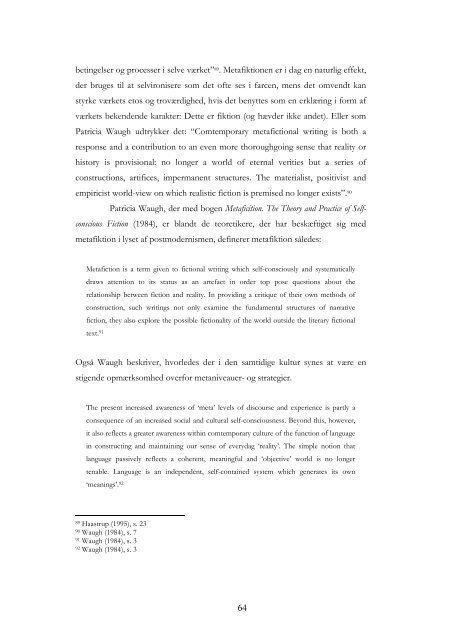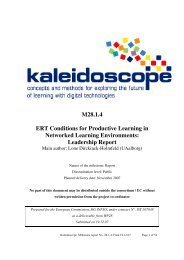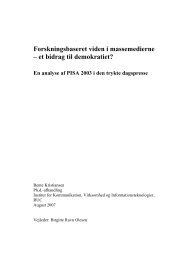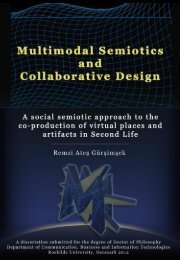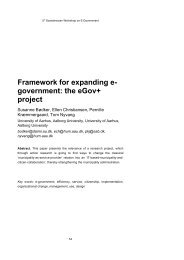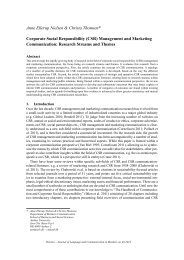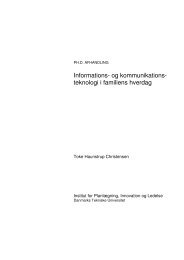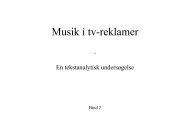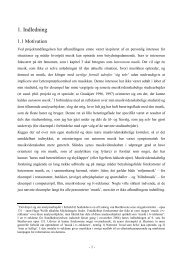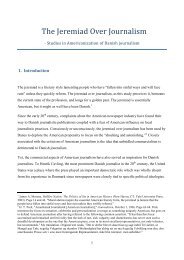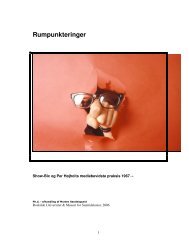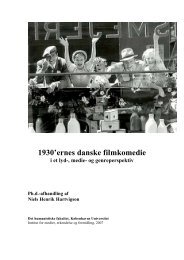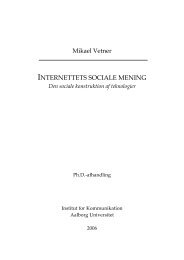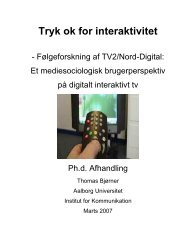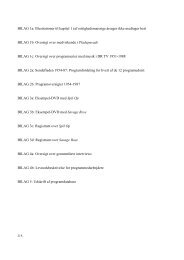- Page 1 and 2:
LISBETH OVERGAARD NIELSEN LARS VON
- Page 3 and 4:
KAPITEL 2: Epidemic og kunsten at l
- Page 5 and 6:
Filmens leg med skuespil og ‘virk
- Page 7 and 8:
BILAG…………………………
- Page 9 and 10:
fortællermæssige som visuelle niv
- Page 11 and 12:
De to indledende film, Forbrydelsen
- Page 13 and 14:
œuvre og en instruktør, der kan b
- Page 15 and 16:
Desværre viser det sig, at det sæ
- Page 17 and 18:
inspirerende grundlag, som Bordwell
- Page 19 and 20: Det er ikke adskillelsen mellem den
- Page 21 and 22: litteraturens funktionsrelation - p
- Page 23 and 24: at man kan få dette indtryk, ligge
- Page 25 and 26: Et tredje centralt begreb hos Iser
- Page 27 and 28: deres mulige symbolik og intertekst
- Page 29 and 30: og tematik; og især af deres filmh
- Page 31 and 32: Kapitel fire tager med Breaking the
- Page 33 and 34: abstrakte de end måtte være, elle
- Page 35 and 36: og ‘forstyrre’ receptionen? Kan
- Page 37 and 38: selv. Til sidst i filmen indser Fis
- Page 39 and 40: kræver noget andet af sit medie en
- Page 41 and 42: ituelle selvmord giver dem øgenavn
- Page 43 and 44: førend den hejses højt op i lufte
- Page 45 and 46: illustreres, udtrykkes visuelt. I s
- Page 47 and 48: stemme siger: “Fantasy is okay, b
- Page 49 and 50: Fisher er det, man indenfor en litt
- Page 51 and 52: flyde med på den mentale rejse. En
- Page 53 and 54: opbygningen af en films billedunive
- Page 55 and 56: informationsniveauet fremstår herv
- Page 57 and 58: historiske genrer som film noir og
- Page 59 and 60: udflydende og synsvinklen inkonsist
- Page 61 and 62: Retrospektiv aktualisering Lars von
- Page 63 and 64: Trier synes det spændende at ligge
- Page 65 and 66: tekniske eksperimenter og visuelle
- Page 67 and 68: hvis Claes Kastholm Hansen sørgede
- Page 69: fra traditionel filmproduktion. Beg
- Page 73 and 74: metafilm), så kan Epidemic karakte
- Page 75 and 76: alvor, fiktion eller virkelighed? D
- Page 77 and 78: Slutscenen her er, som så ofte i T
- Page 79 and 80: den stil, han flere gange praktiser
- Page 81 and 82: For det første er indklipsbilleder
- Page 83 and 84: og opbygning, et emne, der leges vi
- Page 85 and 86: peger på, at verden måske lige s
- Page 87 and 88: op i hovedet’ på tilskueren. Der
- Page 89 and 90: kroppene udsættes for perforeringe
- Page 91 and 92: Metoden med at lave filmoptagelsern
- Page 93 and 94: Inden disse undersøgelser atter ge
- Page 95 and 96: egrænsningens kunst og introducere
- Page 97 and 98: I CONFESS! (third manifesto) Seemin
- Page 99 and 100: univers, Trier skaber omkring sig s
- Page 101 and 102: Citatet er centralt for forståelse
- Page 103 and 104: lyder dyster, ‘skæbnesvanger’
- Page 105 and 106: ord som et virkemiddel, der tillade
- Page 107 and 108: med det realistiske udtryk, men der
- Page 109 and 110: Et tilsvarende spring i rum og tid
- Page 111 and 112: illedflader ved siden af hinanden,
- Page 113 and 114: Leo en dumrian og vil ikke lytte ti
- Page 115 and 116: med andre ord ikke givet i billeder
- Page 117 and 118: og hermed virkeligheden. Ikke desto
- Page 119 and 120: Med Triers søgende eksperimenter a
- Page 121 and 122:
Virkner og Kirsten Rolffes. En ande
- Page 123 and 124:
Med historien om Bess og Jan overta
- Page 125 and 126:
musik. Hertil har genren fået fuld
- Page 127 and 128:
henvendelse, der som nævnt bryder
- Page 129 and 130:
moments and in extreme situations,
- Page 131 and 132:
filmens paramoderne karakter. 172 K
- Page 133 and 134:
Trier har med kameraets sensitive,
- Page 135 and 136:
Lydene er optaget meget højt uden,
- Page 137 and 138:
usædvanligt. Herefter fører Jans
- Page 139 and 140:
har knap nok været tid til at ford
- Page 141 and 142:
debat, hvor filmen af nogle blev be
- Page 143 and 144:
Wivel. Hun sprang senere fra, hvorf
- Page 145 and 146:
Statementets anden mere nutidige be
- Page 147 and 148:
Det Gode Og Det onde (1975) og Nota
- Page 149 and 150:
kunstigt skabte kulisser anvendes v
- Page 151 and 152:
dem for at følge det, der foregår
- Page 153 and 154:
dramatisk action og derfor lettere
- Page 155 and 156:
udtryk. Selv forklarer instruktøre
- Page 157 and 158:
I dag må selve dogmeæstetikken be
- Page 159 and 160:
Lars von Trier understreger, at Idi
- Page 161 and 162:
Idioterne er som Festen filmet med
- Page 163 and 164:
Filmens leg med skuespil og ‘virk
- Page 165 and 166:
filmen flere distancefremmende elem
- Page 167 and 168:
chokeres med dem alle. “Nu er det
- Page 169 and 170:
“smilet i det danske filmmiljø o
- Page 171 and 172:
genreadoption forstået som en rege
- Page 173 and 174:
ackstage-musical 221 42. Gade fra 1
- Page 175 and 176:
Selvom Eigtved ikke tager udgangspu
- Page 177 and 178:
forbindelse med en filmforevisning,
- Page 179 and 180:
Som Bess går Selma langt længere,
- Page 181 and 182:
fotograferingen i Breaking the Wave
- Page 183 and 184:
men hvor både Hollywood musicalen
- Page 185 and 186:
Dansescenerne træder dog også ud
- Page 187 and 188:
filmprojektets immanente søgen eft
- Page 189 and 190:
udtryk for Selmas fantasi, er Selma
- Page 191 and 192:
characteristic of the American film
- Page 193 and 194:
ærbødigt tilbage og går over i s
- Page 195 and 196:
appellerer til en næsten ur-agtig
- Page 197 and 198:
KAPITEL 7 Dogville: Allegori, Verfr
- Page 199 and 200:
spe og ‘byens filosof’, får ov
- Page 201 and 202:
I Dogville går Trier et skridt vid
- Page 203 and 204:
Også Dogville er afsondret, både
- Page 205 and 206:
aspekt. Teknisk og formmæssigt uds
- Page 207 and 208:
minder den tilskueren om sin fiktiv
- Page 209 and 210:
satte også spørgsmål ved vore no
- Page 211 and 212:
derfor på nogen måde at gøre res
- Page 213 and 214:
At Dogville på én og samme tid op
- Page 215 and 216:
En anden effekt af skuespillets fun
- Page 217 and 218:
at uden et realistisk lydbillede vi
- Page 219 and 220:
siger hun, den trier’ske sørøve
- Page 221 and 222:
det, de fleste almindelige menneske
- Page 223 and 224:
Dogme 95 i ryggen et skæringspunkt
- Page 225 and 226:
KAPITEL 8 Lars von Trier: En perfor
- Page 227 and 228:
fremtræden som en art performance
- Page 229 and 230:
til personen Lars von Trier, hvem h
- Page 231 and 232:
I denne selvskabte fortælling kan
- Page 233 and 234:
uanset hvilken opfattelse der hæld
- Page 235 and 236:
pointerer, at “in a certain manne
- Page 237 and 238:
Uden i øvrigt at tage afstand fra
- Page 239 and 240:
mod auteuren og det udenomsværk, d
- Page 241 and 242:
medvirkende et stærkt tilhørsforh
- Page 243 and 244:
Modsat billedkunsten har filmkunste
- Page 245 and 246:
fordringer og den modernistiske spl
- Page 247 and 248:
Afhandlingens øvrige kapitler har
- Page 249 and 250:
men kun over for billedet af den hy
- Page 251 and 252:
form og i den nærmest narcissistis
- Page 253 and 254:
filmen samtidig insisterede på en
- Page 255 and 256:
publikum. Herved kan de komme til a
- Page 257 and 258:
occupy the radical nihility of the
- Page 259 and 260:
økonomiens betydning. Triers filma
- Page 261 and 262:
og udstiller sig selv. Hvor Guldhje
- Page 263 and 264:
- “Telling som showing: Dramatise
- Page 265 and 266:
http://www.artnet.com/magazine_pre2
- Page 267 and 268:
- “Uden kontrol”, i Weekendavis
- Page 269 and 270:
Olsen, Michel: Værk og læser. En
- Page 271 and 272:
Wivel, Peter: “Von Triers messe f
- Page 273 and 274:
Medvirkende Elphick, Michael Fisher
- Page 275 and 276:
Distribution Pathé-Nordisk Censur
- Page 277 and 278:
Idioterne (Lars von Trier, DK/SE/DE
- Page 279 and 280:
Kostic, Vladica Gene, Selmas søn K
- Page 281 and 282:
BILAG 1: DOGMEMANIFESTET DOGME 95 D
- Page 283 and 284:
BILAG 2: KYSKHEDSLØFTET ”Jeg lov
- Page 285 and 286:
1 BILAG 3: SANGTEKSTEN TIL SØRØVE
- Page 287 and 288:
BILAG 4: LARS VON TRIERS TAKKETALE
- Page 289 and 290:
LARS VON TRIERS FILM Filmsproglig s
- Page 291 and 292:
mellem forfatter og værk og recept
- Page 293 and 294:
Den moderne auteur Lars von Trier e
- Page 295 and 296:
search is also more than its compon
- Page 297 and 298:
tour de force. Although the film te


